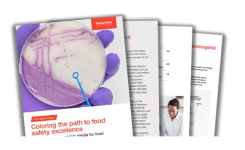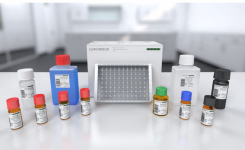Microgen Listeria-ID Improves Differentiation of Haemolytic and Non-haemolytic Listeria
go back to news archives Microgen Bioproducts have improved the AOAC-RI Approved Microgen Listeria-ID to make the system the easiest-to-read, user-friendly and cost-effective method of identifying Listeria species on the market today. The Microgen Listeria-ID biochemical identification system consists of 10 sugar fermentation tests, Aesculin hydrolysis and a micro-haemolysis reaction. The system does not require any reagent additions and reduces laboratory costs whilst utilising substrates which conform to all international standards. Microgen Listeria-ID (product code: MID-67) has now been improved to provide the easiest to read method of differentiating haemolytic and non-haemolytic Listeria spp. Haemolytic and non-haemolytic Listeria spp. have traditionally been differentiated by the sub-culture from selective medium to sheep blood agar for the detection of haemolytic activity or by performing the variable, complex and difficult to interpret CAMP test. The inclusion of a sensitive and stable micro-haemolysis in the Microgen Listeria-ID allows for the easy interpretation of haemolysin production by haemolytic Listeria spp.;
As with all the Microgen-ID range, the Microgen Identification System Software (product code: MID60), provides laboratories with the easiest-to-use and most accurate identification package. The Microgen-ID range includes tests for:
|
NOTE: This item is from our 'historic' database and
may contain information which is not up to date.
Source : Microgen Bioproducts Ltd. View Company Information
Posted on May 14, 2009
















